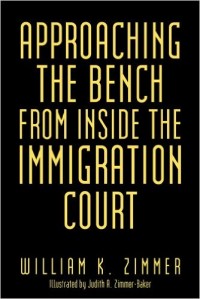Title: Approaching the Bench From Inside the Immigration Court
Author: William K. Zimmer
ISBN: 9781481729086
Publisher: AuthorHouse
Pages: 195
Genre: Law / General
Reviewed by: Derek Sun
Buy on Amazon
Pacific Book Review
Zimmer begins the book by describing the history of the American immigration court, and discusses a panoply of topics with extensive detail and aplomb, showing just how well he knows his subject and how qualified he is to write such a book. The facts provided on each page about notable legislation, crucial figures in government, and changing trends in politics initially appear excessive, but every bit of information contributes to greater understanding and the assembly of a bigger picture of immigration law in its current form and how it came to be that way.
Zimmer cautions at the preface of the book that this is not an academic study of immigration law, but it certainly may feel like an academic work to many readers, due to the dense subject matter and a tone that sometimes feels dry to the point of causing a drought in readers’ minds. Lists and quotations of laws and bureaucratic procedures are chores to read, and it is tough to stay engaged after reading passage after passage of complex legal material. The author leaves no stone unturned in his exploration of the intricacies and situations people applying for citizenship encounter, and at times the book stops being an entertaining and informative memoir and is a handbook enumerating legal contradictions and dilemmas that only a very specific group of people will read with vigor.
When Zimmer writes about his personal experiences and views and shares stories of the people he worked with, the book is at its best. At a number of points, however, it feels like he merely copies legislation and pastes it into the book for people to read. Real court cases, animated by sketches and testimony, make up one of the book’s most unique offerings. They breathe life into the ponderous pages of legalese and give readers a vivid glimpse of law in action. The problem is that there ought to be more of these cases to draw and sustain readers’ attention; many readers may choose to jump and skip between chapters to find parts that are most relevant or interesting to them personally, rather than read the book from start to finish.
Judge Zimmer has done the American public a great service by writing this book. Law becomes enthralling, important, and living after reading what he has written. The people who will find this book most useful are prospective citizens and law students wishing to become experts on immigration and citizenship law, but anyone with an interest in understanding the history of American immigration and important political and social debates about immigration and naturalization should start by reading this book.
 William K. Zimmer is a retired Immigration Judge with 35 years of federal civil service experience, who has worked as a customs inspector, felony prosecutor in the State of Texas, immigration trial attorney and deputy district counsel in the former INS Houston litigation unit. He has raised 4 children and presently lives in Houston Texas. He enjoys bicycling and classical music and is a bassist in the Texas Medical Center Orchestra. He also is a baseball umpire and a member of the Texas Association of Sports Officials in the Houston area.
William K. Zimmer is a retired Immigration Judge with 35 years of federal civil service experience, who has worked as a customs inspector, felony prosecutor in the State of Texas, immigration trial attorney and deputy district counsel in the former INS Houston litigation unit. He has raised 4 children and presently lives in Houston Texas. He enjoys bicycling and classical music and is a bassist in the Texas Medical Center Orchestra. He also is a baseball umpire and a member of the Texas Association of Sports Officials in the Houston area.



Follow Us